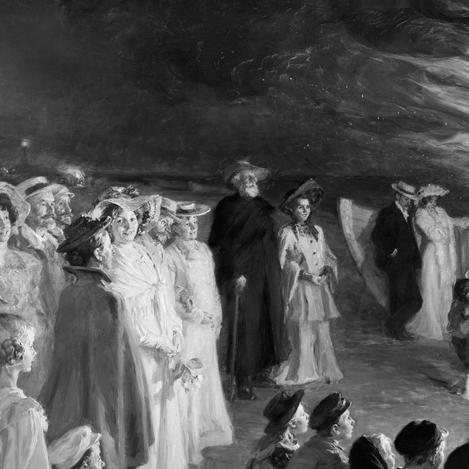Chanel Beads enchant on their eerie debut Your Day Will Come
"Your Day Will Come"

A debut record is supposed to be a bold, image-carving statement of artistic identity.
But for Shane Lavers, aka Chanel Beads, his debut record, Your Day Will Come, doesn't trumpet its arrival; rather, it whispers, concealing its identity in mystery and allure.
Throughout, voices, uncannily unidentifiable, are broadcasted from the ether, chanting with resounding ambiguity then projected in fragments. And yet, something oddly human remains within this untethered and unorthodox pop record that draws just enough breath to serve two purposes. On the one hand, it's like Lavers, with the help of live bandmates, Maya McGrory and Zachary Paul, have conjured two ghosts who've come to perform a collection of pop songs refracted from the past, pointing toward the future. On the other, these entities have emerged to reveal their cursed purpose and to rid themselves of the anxieties and regrets that pester them to return to the liminal space to play these haunted pop songs.
Eerie is the most appropriate word that captures the aurally diffusive nature of this record. There's something emerging from where there's nothing but was once full of life, as each track unravels with a suggestive presence that slowly lurches, beckoning listeners to listen a little more attentively than they're accustomed to. Songs gracefully crash and coalesce into each other, beginning with “Dedicated To The World”, where distorted strings prance about with an excitable jangle, inhaling and exhaling, desiring to be of full flesh, despite the burden of doomful premonitions and dreams of "the end," implied by the track's stirring forewarning: "I saw It All End."
Perhaps the most striking aspect of Lavers’ debut is its unabashed embrace of the abstract. as Lavers unpacks these haunting transmissions of what's to become because of what was, this collection of echoes and hazy sonic figurations evolve with growing sparkling grandeur, with each cut assembling and disassembling with a mesmeric buzz that magnifies by the minute, beginning with “Police Scanner” and “Idea June”. Not so much songs but incantations, this pair of tracks pulls us deeper into the record’s evolving dreamlike vortex. The former is a melange of pop sensibilities from yesteryear, whispering nostalgia while firmly planting itself in the otherworldly. The latter is a stunning showcase of warped strings and acoustic anomalies that shimmer with its own unique, ghostly glow.
Enchanting, pressing and purifying, this assembly of impressionistic pieces hardly says anything with precision. They're underpinned with lyrics, equally noisy and distorted, to match the sounds they narrate. While nothing is explicit, the record hums with an urge to disclose a secret that has been long concealed for the listener's own sake, as if out of protection until we are ready to grasp its intrinsic meaning, and the only way to really tap in is through some special extrasensory perceptiveness.
What is clearly observable, however, is the pronounced grief and the gnawing desire to move forward – to "[bury it ]in the ground," these restless forces demand on the toiling “Urn”. Yet, a foreboding inevitability materialises to account for the past to reflect what will transpire. Is it death? Or is it the mere fear of time fleeting and everything that departs alongside it? "Creeping feeling / Flowers on the graves," these dire images of “I think I saw” convey a nebulous urgency, further echoed by a distorted and vibrant violin as a way of accentuating the record's obscured crises locked away, longing to be decoded.
Though it arrives earlier in the track listing, the title track is the culminating exorcism of these unspoken, gesturing entities, ascending from their own vaporous imprecision from who knows where and why. Though aurally blissful and exultant, this song's choral rapture threatens to leave a void of an unreckoned past. But as they're beckoned back into the ether, the fear of this void is fleeting. An eerie vacuum certainly presides as its final seconds wane; however, it is only briefly explicit in emptiness. Lavers has so keenly left us with a paradoxical and unsolvable presence – a pregnant sparseness purposely carved out for listeners to impress the very things untied and unresolved within their own hearts as the rest of the record unravels.
A compilation of near-ambiance where post-impressionist compositions and disembodied vocals have been slapped together as some misshapen interpretation of pop music, Your Day Will Come entrenches listeners in a place that can only be captured as eerie. These songs are ghosts of other songs, insinuations of what was and what will be. Without this enveloping imprecision, the record would lose all evocation, and this, ironically, is where Chanel Beads is most clear. Amorphous and difficult to pin down, this undefinable hypnagogia is the lasting identity of Chanel Beads, and Your Day Will Come is the vessel from which it was formed.
Get the Best Fit take on the week in music direct to your inbox every Friday

Bon Iver
SABLE, fABLE

Mamalarky
Hex Key

Florist
Jellywish





